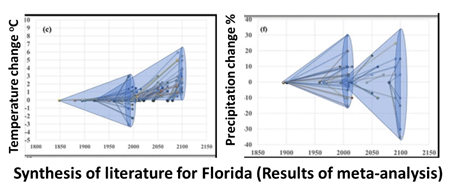August 2018 (Source: This email address is being protected from spambots. You need JavaScript enabled to view it., Florida A&M) - TALLAHASSEE, FL – Decision tools allow for the examination and prediction of impacts of altered climate on natural and managed ecosystems. They are useful in describing future risk, the marginality of systems, and guide actions to mitigate risk. Decades of studies have resulted in various tools, however, a few decision-making tools have been developed for planning and management of ecosystems due to future climate scenarios. Further, there remains a disconnect between the supply and demand of climate information and the need for tailoring the information for decision making purposes. This disconnect is exacerbated by the high volume of studies concerning climate change impacts to date and the availability and number of methods for scenario development. Further, the future is uncertain and unknown, therefore changes and variability in climate are not easily detected.
Given the high volume of studies and lines of evidence, and the availability of a number of methods for developing scenarios and the need to develop decision support tools; that developing a tool that combines scenario development and meta-analysis is novel, warranted and timely. Additionally, it would improve the linkages between climate-impacts research and planning, management, adaptation, and mitigation by providing quantitative information to stakeholders and managers.
Florida has many endemic plants, vertebrates, and insects that are only found in Florida and the tropics. Florida’s 2000 miles coastline contains diverse ecosystems and landscapes and habitat for many endangered species. In general, coastal estuaries and bays are of great ecological value and economic significance (produce about 50% of global ecosystem services that benefit humans). Florida’s agriculture yields 63% of the winter vegetables for the U.S. with revenues of $1.48 billion in 1995–1996. Florida is the fourth most populous state in the US and the third fastest growing state, with more than 17% net increase in population from 2000 to 2010. Florida’s biodiversity is threatened by these related stressors including: increasing, land-use change, increasing population and socioeconomic growth. These stressors and play a crucial role in facilitating adaptive change. The close proximity of coastal ecosystems, large human populations, and high productivity make ecosystems in Florida some of the most heavily utilized and threatened on the planet.
Researchers at FAMU have developed a decision support tool that could reduce the disconnect between the supply and demand for climate information in making decisions from climate change impacts, assessment, of natural and man-made ecosystems. The tool developed by this study has three major components: 1) perform meta-analysis --synthesize and combine recent relevant studies to arrive at conclusions about a body of research on temperature and precipitation changes, 2) develop climate scenario(s) [synthetic or incremental] from meta-analysis, Incremental scenario refers to a method of scenario development where a climatic variable is changed incrementally by arbitrary amounts and 3) development causal chain and loops. Although the developed decision tool is demonstrated by applying it to selected ecosystems and environments in Florida, USA, the tool can be used by multiple stakeholders in ecosystems and environments throughout the world.
 Meta-analyses result for Florida: 32 studies revealed precipitation changes ranged between +30% and -40%, while and temperature changes ranged from +6 °C and -3 °C for Florida. Meta-analysis represents a systematic approach to combining the results of relevant studies to arrive at conclusions about, how a body of research has been applied.
Meta-analyses result for Florida: 32 studies revealed precipitation changes ranged between +30% and -40%, while and temperature changes ranged from +6 °C and -3 °C for Florida. Meta-analysis represents a systematic approach to combining the results of relevant studies to arrive at conclusions about, how a body of research has been applied.
Incremental scenarios for Florida: Scenarios must be coherent, internally consistent, and represent plausible descriptions of possible future climate states. From meta-analysis, seven incremental scenarios, were developed at 10% increments in the precipitation change range (+30%, +20%, +10%, -10%, -20%, -30%, -40% precipitation changes) and nine scenarios with 1°C increments in the temperature change range (+6°C, +5°C, +4°C, +3°C, +2°C, +1°C, -1°C, -2°C, -3°C for temperature changes).
The causal chains/loops in Florida (Fig. below) were developed using Driver-Pressure-State-Impact-Response (DPSIR) framework for selected ecosystems and resources (e.g. agro-ecosystem, mangroves, water resources and sea turtles). The meta-analysis in these ecosystems, incremental scenarios as well as author expertise on the topic was used to identify the indicators used to represent the components of the DPSIR framework using chains/loops. The selected ecosystems and resources is impacted due to pressure exerted by the changes in temperature and pressure (incremental scenarios) and their response to them (e.g. mitigation and adaptation strategies) were shown in the causal chains/loops.

Anandhi, A., Sharma, A. and Sylvester, S., 2018. Can meta‐analysis be used as a decision making tool for developing scenarios and causal chains in eco‐hydrological systems?‐Case study in Florida. Ecohydrology, online.











